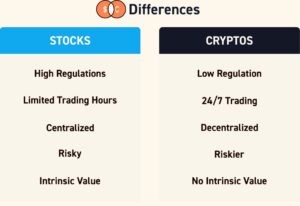How to Invest in Stocks or Crypto for Beginners: A Step-by-Step Guide
Did you know that the average person who started investing $200/month in the S&P 500 20 years ago would now have over $130,000? Investing in stocks or crypto can be a powerful way to build wealth—even if you’re starting small.
If you’re new to the world of finance and wondering how to invest in stocks or crypto for beginners, you’ve come to the right place. This comprehensive guide will walk you through everything you need to know—from understanding the basics to avoiding common pitfalls.
We’ll cover:
- Why investing matters for beginners
- Stocks vs. crypto: Key differences
- A step-by-step plan to start investing
- Best practices and expert tips
- Mistakes to avoid as a beginner investor

Why Investing Can Be Intimidating for Beginners
Many people hesitate to start investing because they feel overwhelmed by financial jargon, market volatility, or the fear of losing money. According to a 2023 survey by FINRA, nearly 40% of Americans don’t own any investments.
But here’s the truth: You don’t need a finance degree or a six-figure income to start investing. With the right knowledge and mindset, anyone can begin building a portfolio—whether in traditional stocks or digital assets like cryptocurrency.
Let’s break down the two main investment vehicles:
Stocks vs. Cryptocurrency
| Feature | Stocks | Cryptocurrency |
|---|---|---|
| Volatility | Moderate | High |
| Regulation | Heavily regulated | Largely unregulated |
| Entry Cost | Varies (can buy fractional shares) | Low (some coins cost less than $1) |
| Risk Level | Lower | Higher |
Step-by-Step Guide: How to Start Investing in Stocks or Crypto

Step 1: Define Your Financial Goals
Before you invest, ask yourself: What are you trying to achieve?
- Retirement savings
- Buying a home
- Short-term gains
- Educational funds
Setting clear goals helps you determine your risk tolerance and time horizon.
Step 2: Build an Emergency Fund
Before investing, make sure you have at least 3–6 months’ worth of living expenses saved up. This ensures you won’t panic-sell during a market downturn.
Step 3: Choose a Platform
There are many platforms available for beginners:
- Robinhood – Great for zero-commission trading
- Webull – Offers free stocks for signing up
- Coinbase – Ideal for buying and holding crypto
- EasyParcel Investment – For local users in Southeast Asia

Step 4: Learn the Basics of Each Market
Stock Market:
- Buy shares of companies
- Can earn dividends
- Long-term growth is generally stable
Crypto Market:
- Decentralized, global, and fast-moving
- Highly speculative
- Can offer high returns—but also high losses
Step 5: Start Small and Diversify
You don’t need thousands to get started. Many platforms allow you to invest with just a few dollars. Focus on diversifying across sectors and asset types to reduce risk.

Top Tips for Beginner Investors
1. Practice Dollar-Cost Averaging (DCA)
DCA involves investing a fixed amount regularly, regardless of market conditions. This reduces the impact of volatility.
2. Stay Informed but Avoid Overreacting
Market news can be overwhelming. Stick to trusted sources and avoid making emotional decisions.
“Time in the market beats timing the market.” — Investopedia
3. Use Stop-Loss Orders (Crypto Only)
In crypto trading, setting stop-loss orders can help limit your losses when prices drop suddenly.
4. Keep Learning
Follow reputable blogs, listen to podcasts, and take online courses. Knowledge is your best tool for success.

Common Mistakes to Avoid When Investing
1. Investing Money You Can’t Afford to Lose
Only invest what you’re willing to lose, especially in crypto markets.
2. Chasing “Hot Tips” or Trends
Just because something is trending doesn’t mean it’s a good investment. Always do your research.
3. Putting All Eggs in One Basket
Over-concentration in one stock or coin increases risk. Spread your investments across different assets.
4. Ignoring Fees and Taxes
Transaction fees, withdrawal costs, and taxes can eat into your profits. Understand them before investing.
What Experts Say About Beginner Investing
Case Study: Sarah’s First Investment Journey
Sarah, a 24-year-old teacher, started investing $50/month in ETFs through Robinhood. After two years, her portfolio grew by 15%, even during market dips. She credits her success to consistent investing and staying away from hype-driven assets.
Expert Quote
“The key for beginners is consistency, not perfection. Start early, stay patient, and keep learning.” — John Bogle, Founder of Vanguard Group
Start Building Wealth Today
Learning how to invest in stocks or crypto for beginners doesn’t have to be complicated. Whether you choose stocks, crypto, or both, the most important thing is to start today. Set realistic goals, educate yourself, and stay disciplined.
Remember, investing is a marathon, not a sprint. Don’t let short-term fluctuations scare you off. With time and patience, you can grow your wealth and secure your financial future.
Got questions or want to share your first investment experience? Leave a comment below!
Want to learn more about personal finance? Check out our guides on the best budgeting apps and how to build an emergency fund.
Frequently Asked Questions (FAQ)
Q1: Is it safe for beginners to invest in crypto?
A: Yes, but with caution. Crypto is highly volatile, so only invest what you can afford to lose.
Q2: Can I start investing with $100?
A: Absolutely! Many platforms allow fractional investing, so even small amounts can go a long way.
Q3: Should I invest in stocks or crypto?
A: It depends on your goals and risk tolerance. Stocks are generally safer and more stable, while crypto offers higher potential returns with greater risk.
Q4: How much should I invest each month?
A: Aim to invest at least 10–20% of your monthly income after covering essentials and saving for emergencies.
Q5: Do I need a broker to invest in stocks?
A: Yes, but many online brokers now offer low-cost or no-commission trades, making it easy for beginners.
Q6: Are there tax implications for crypto?
A: Yes. In most countries, crypto gains are taxable. Always consult a tax professional or use reporting tools like CoinTracking.
Q7: What’s the best app for beginner investors?
A: Popular choices include Robinhood, Webull, Coinbase, and Stash. Compare features and fees before choosing one.

Leave a Comment